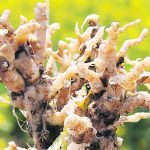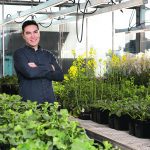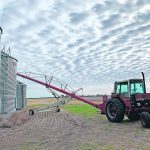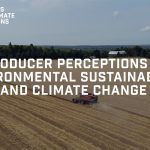
Stories by Robert Arnason

WINNIPEG — There are now 55 different types of clubroot across the Prairies. About a decade ago, in 2016, the number of pathotypes was 17. The increasing number of variants of the soil-borne disease is a concern, but canola growers need to remember that most of these pathotypes are rare, said Steve Strelkov, a plant […] Read more

Researcher experiments with burying kochia
Agriculture Canada scientist looked at a number of ways to kill the weed by covering it and found chaff worked best
WINNIPEG —- Every weed has a weakness. For kochia, the pesky tumbleweed that’s become difficult to control in parts of Western Canada, that weakness is burial. Research has shown the seeds of kochia are less likely to germinate when they’re buried in the soil. For the last few years, Agriculture Canada scientists in Saskatoon have […] Read more
Tiny allies may help withstand drought
Agriculture Canada researchers are examining soil microbes to find out if they can help canola withstand dry times
After multiple years with insufficient moisture and yet another dry summer in 2024, it’s become painfully obvious that Canada’s canola industry needs varieties with improved drought tolerance. That’s not an easy task for breeders. It is a complicated trait that involves dozens of genes, signals and processes within a plant. There isn’t a magic gene […] Read more
Verticillium, blackleg and gophers
Multiple pests hammered canola in 2024
Looking back at the 2024 growing season, it’s easy to point out the main reason for poor canola yields — blistering hot weather and insufficient rain in July and August. Canola growers in Saskatchewan and Alberta posted an average yield of about 33 bushels per acre, using data from provincial crop reports. Other stories in […] Read more
Extra sharp pencils needed
Farm management expert says 'wise' investments will dictate crop profitability in 2025
WINNIPEG — It’s four and a half months until Canadian farmers will plant their next crop and at least eight months before the next harvest. But as of the middle of December, potential profits from growing grains, oilseeds and pulses are looking grim in Western Canada. “Costs have come down a little bit in 2025, […] Read more
Farm revenues and profits were strong in 2023
WINNIPEG — It seems like a long time ago, but 2023 was a great year for Canadian farmers. Statistics Canada data on farm operating revenues and expenses released Dec. 6 shows that total operating revenues were $117 billion in 2023, up from $108 billion in 2022 and $97 billion in 2021. Breaking that down by […] Read more

Climate change worries Canadian farmers: poll
WINNIPEG — A poll released Dec. 11 suggests that Canadian farmers worry more about the impacts of climate change than they do about input costs and market prices for canola, corn, wheat and cattle. The poll of 858 producers from coast to coast determined that farmers rank climate change as their No. 1 concern. “When […] Read more

VIDEO: The dollars and sense of on-farm fertilizer
SPERLING, Man. — The retail price of anhydrous ammonia fertilizer was about $1,100 per ton this summer in Western Canada. That number comes from Curtis Hiebert, who farms near Sperling, Man. Hiebert now has a green ammonia production system on his farm, which has a capacity of 100 tons of ammonia per year. Related stories: […] Read more

VIDEO: Green ammonia moves closer to reality on Man. farm
Company builds an on-farm plant that will allow the farmer to produce 25 per cent of his green ammonia requirements and gain control over of what can be volatile prices for the fertilizer
SPERLING, Man. — Twenty farmers, agronomists and academics recently gathered on a farmyard near Sperling, Man., to look at six or seven shipping containers that house a unique technology. The equipment can convert electricity into anhydrous ammonia, allowing farmers to produce their own nitrogen fertilizer. Ian Clifford, co-founder of FuelPositive, the Canadian company that developed […] Read more
VIDEO: Is green ammonia the new diesel?
SPERLING, Man. — The data is clear: diesel is hard to beat. Using any metric — cost per litre, energy by weight or energy by volume — diesel is a superior fuel to alternatives like hydrogen or ammonia. “Diesel is an absolutely amazing energy carrier,” said David Layzell, a University of Calgary professor and energy […] Read more




